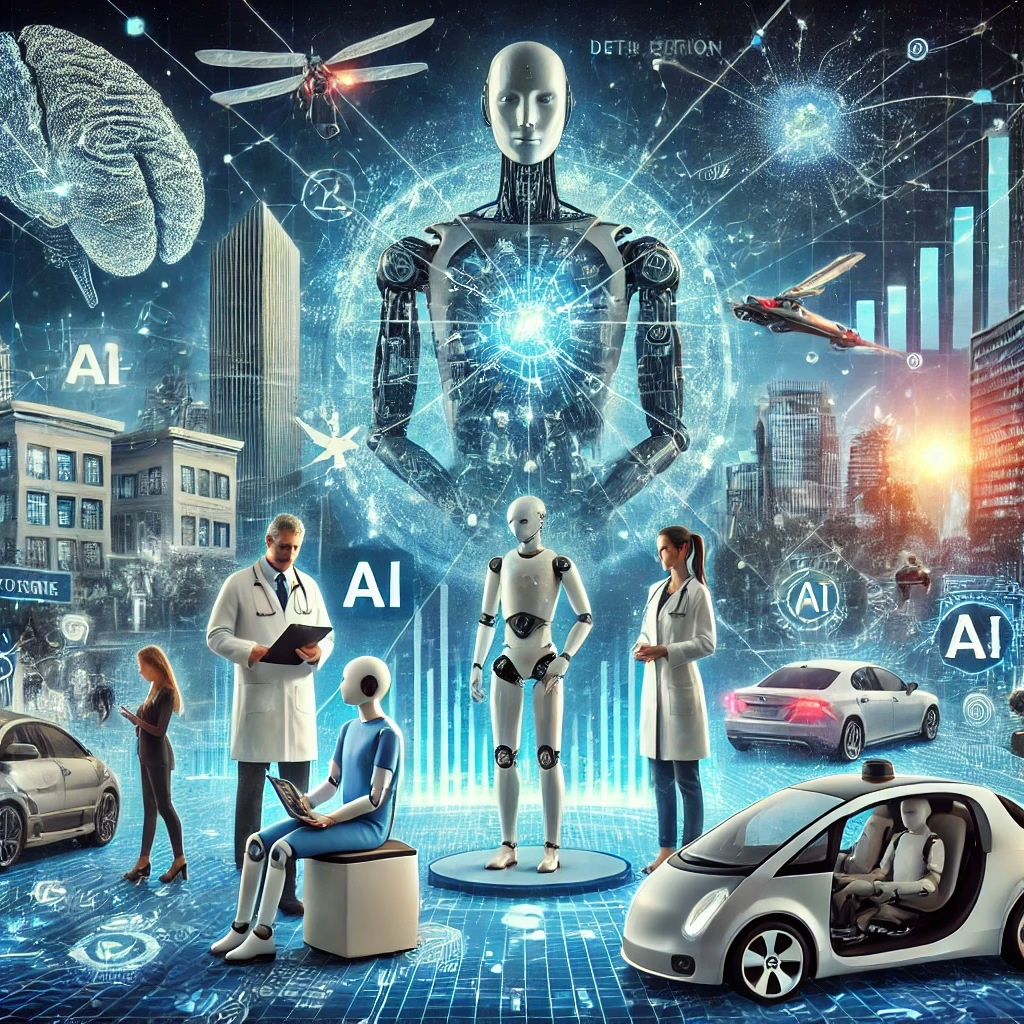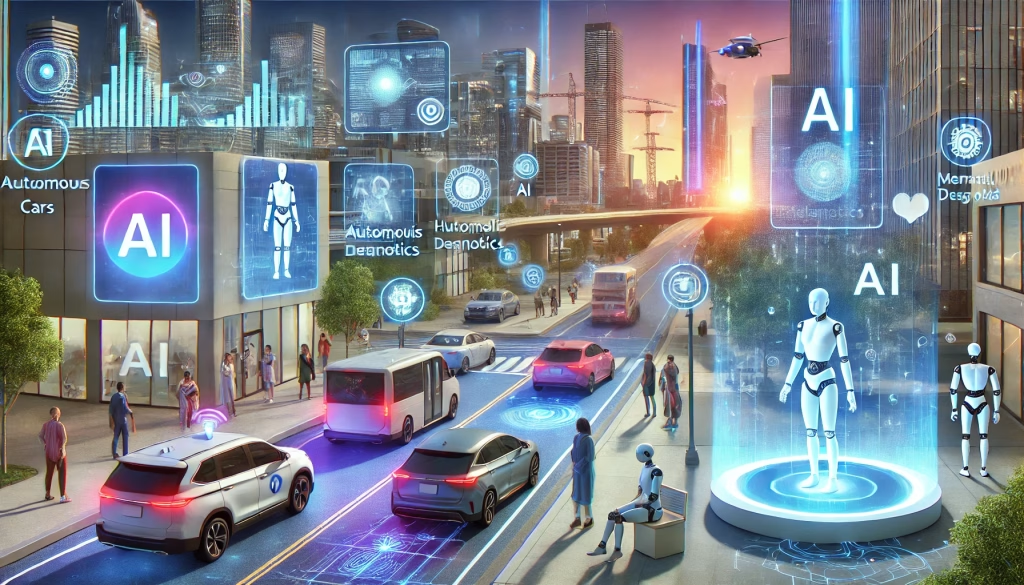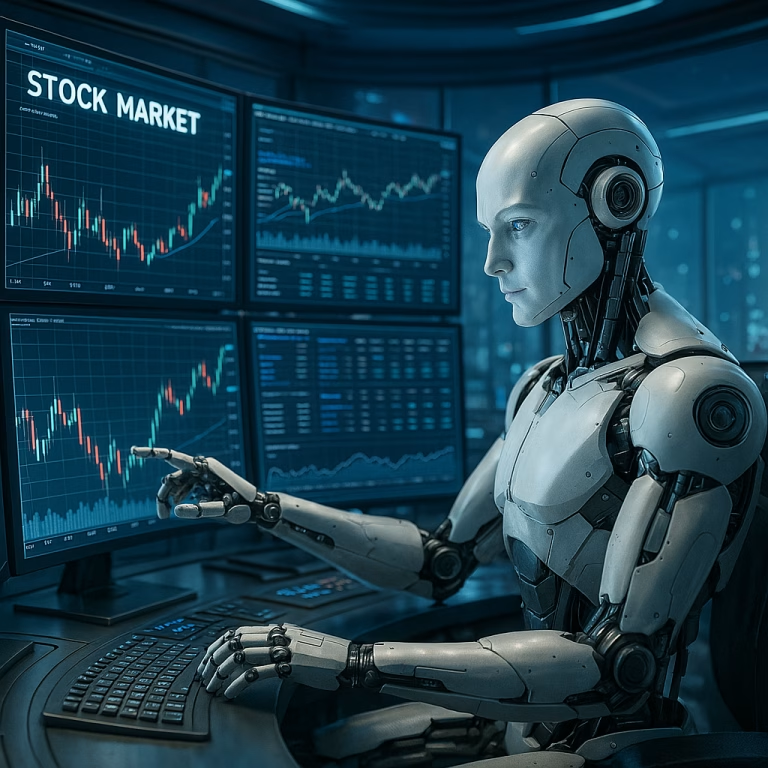
Artificial Intelligence (AI) is transforming industries, enhancing daily life, and shaping the future. From automation to personalized recommendations, AI is evolving at an unprecedented pace. As businesses, governments, and individuals continue to integrate AI into their daily lives, the technology is making its presence felt across multiple sectors. Let’s explore the latest trends and updates on how AI is changing the world today.
1. AI in Healthcare 🚑
AI is revolutionizing healthcare by improving diagnosis, treatment, and patient care. AI-driven tools can detect diseases early, assist doctors in surgeries, and even predict outbreaks. Medical professionals use AI-powered imaging tools to diagnose diseases such as cancer more accurately and efficiently.
AI in Diagnostics and Imaging
Deep learning models trained on vast datasets are now capable of detecting abnormalities in X-rays, MRIs, and CT scans with higher accuracy than human radiologists. This reduces errors, speeds up diagnoses, and ensures timely treatment for patients.
AI in Personalized Medicine
AI is advancing precision medicine by analyzing genetic data to create personalized treatment plans. AI-driven platforms help doctors predict which treatments will be most effective for individual patients based on their genetic makeup and medical history.
AI in Drug Discovery
Pharmaceutical companies use AI to speed up drug discovery and development. Machine learning algorithms analyze millions of chemical compounds to identify potential drug candidates, significantly reducing the time and cost associated with drug research.
🔗 Read more about AI in healthcare
2. AI-Powered Automation 🤖
Businesses are leveraging AI to automate repetitive tasks, boosting efficiency and reducing costs. AI-driven automation is seen in customer service, manufacturing, finance, and beyond.
AI Chatbots and Virtual Assistants
AI chatbots provide 24/7 customer support, answer queries, and assist customers in real-time. Companies like Amazon, Google, and Apple have developed AI-driven virtual assistants like Alexa, Google Assistant, and Siri, improving user experiences.
AI in Manufacturing
Industrial robots powered by AI are optimizing assembly lines, reducing human errors, and increasing productivity. AI-powered predictive maintenance systems analyze data from machines to detect potential failures before they occur, minimizing downtime and reducing maintenance costs.
AI in Supply Chain Management
AI enhances supply chain efficiency by predicting demand, optimizing inventory management, and reducing waste. Logistics companies leverage AI to track shipments, predict delays, and improve route planning.
3. AI & Cybersecurity 🔒
As cyber threats increase, AI is stepping up to protect data and prevent attacks. AI-driven security solutions detect anomalies, prevent breaches, and safeguard sensitive information.
AI in Threat Detection
Machine learning algorithms analyze vast amounts of data to detect unusual patterns that could indicate cyber threats. AI-powered systems can identify and neutralize malware, phishing attempts, and ransomware attacks in real-time.
AI in Fraud Prevention
Financial institutions use AI to monitor transactions and detect fraudulent activities. AI-driven fraud detection systems analyze spending patterns and flag suspicious transactions instantly.
AI in Data Privacy and Compliance
AI helps companies comply with data privacy regulations by monitoring and managing sensitive information securely. Businesses leverage AI-driven encryption and access control systems to protect user data from breaches.
🔗 Stay updated on AI cybersecurity
4. Generative AI & Creativity 🎨
AI is now creating art, music, and even writing content. AI-driven tools empower creators to experiment with new ideas and automate creative processes.
AI in Content Creation
AI-powered writing tools like ChatGPT generate blog articles, reports, and social media posts, helping businesses maintain an active online presence. AI tools can also summarize complex topics, translate languages, and generate SEO-optimized content.
AI in Art and Design
AI-generated art tools like DALL·E create stunning visuals based on text descriptions. Designers use AI-powered platforms to enhance images, create animations, and develop unique graphics.
AI in Music and Entertainment
AI-generated music platforms compose original songs, enhance soundtracks, and personalize music recommendations based on user preferences. Streaming services like Spotify and Netflix use AI to curate content tailored to individual tastes.
🔗 Explore AI-generated creativity
5. AI in Finance & Trading 📈
AI is optimizing financial markets by predicting trends, analyzing data, and automating trading. AI-driven solutions enhance risk management, investment strategies, and fraud prevention.
AI in Algorithmic Trading
Financial firms use AI-driven trading bots to analyze market trends, predict price movements, and execute trades at optimal times. These AI-powered trading strategies maximize profits while minimizing risks.
AI in Risk Assessment
Banks and lending institutions leverage AI to assess creditworthiness by analyzing customer data, transaction history, and behavioral patterns. AI-powered risk assessment models reduce loan defaults and optimize lending decisions.
AI in Customer Service
AI chatbots assist customers with banking queries, loan applications, and account management, streamlining financial services and improving user experiences.
6. AI and the Future of Work 🏢
AI is reshaping job markets, creating new roles while automating others. While AI-driven automation replaces repetitive jobs, it also opens up opportunities for workers to focus on more strategic and creative tasks.
AI in Hiring and Recruitment
Companies use AI-driven platforms to screen resumes, analyze candidate profiles, and predict job performance. AI-powered recruitment tools streamline hiring processes and improve diversity in hiring decisions.
AI in Employee Productivity
AI enhances workplace efficiency by automating administrative tasks, managing schedules, and providing real-time insights on employee performance. Organizations use AI-driven analytics to optimize workflows and improve collaboration.
AI and Remote Work
AI-driven collaboration tools enable seamless remote work by automating meetings, transcribing conversations, and providing virtual assistants to support teams in real-time.
7. AI for Sustainable Solutions 🌍
AI is helping combat climate change by optimizing energy use, predicting natural disasters, and advancing clean technology solutions.
AI in Renewable Energy
AI-powered smart grids optimize energy distribution, reducing waste and improving efficiency. AI-driven weather forecasting models predict energy demands, ensuring a sustainable power supply.
AI in Environmental Conservation
AI helps monitor deforestation, track wildlife populations, and detect illegal fishing activities. Conservationists use AI-powered drones to collect data and protect endangered species.
AI in Disaster Prediction and Response
AI-driven early warning systems analyze climate patterns to predict hurricanes, floods, and wildfires, enabling governments and communities to prepare in advance.
🔗 Discover AI’s role in sustainability
Final Thoughts 💡

AI is no longer the future—it’s the present. Whether it’s improving industries, enhancing creativity, or securing data, AI’s impact is undeniable. The rapid advancement of AI presents both opportunities and challenges, making it crucial for businesses, professionals, and individuals to stay informed about the latest developments.
AI will continue to evolve, transforming how we live, work, and interact with technology. Understanding AI’s potential and its implications on society will help us harness its power for the greater good.
👉 Share this article and spread awareness about AI’s growing influence! #AI #ArtificialIntelligence #TechTrends #FutureofAI














